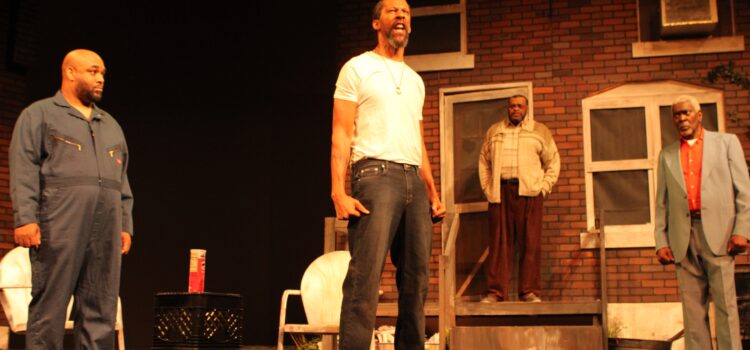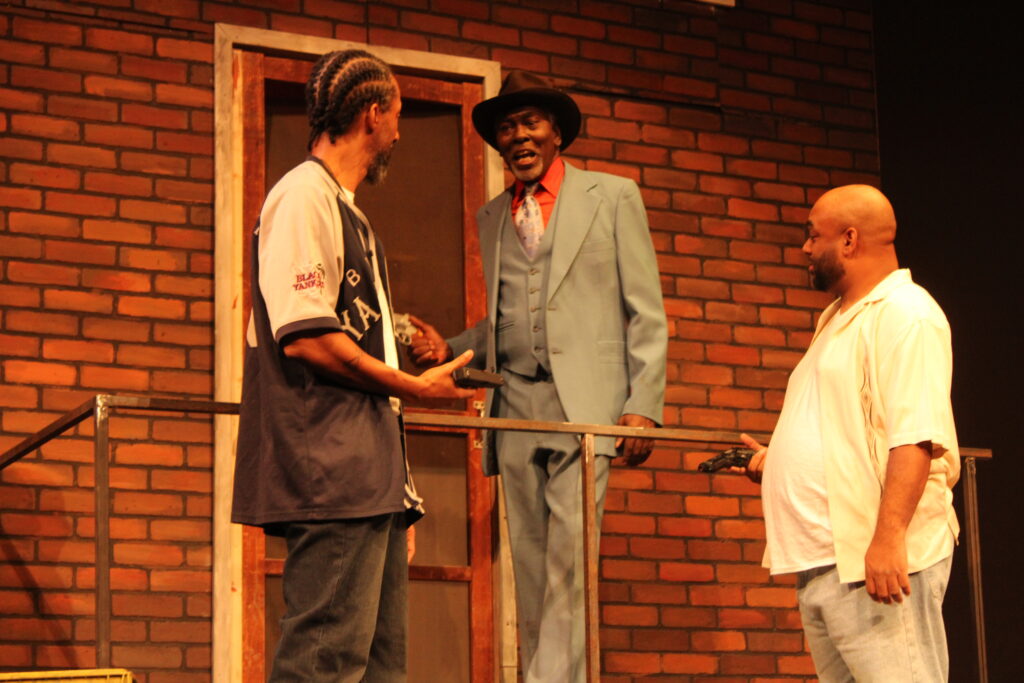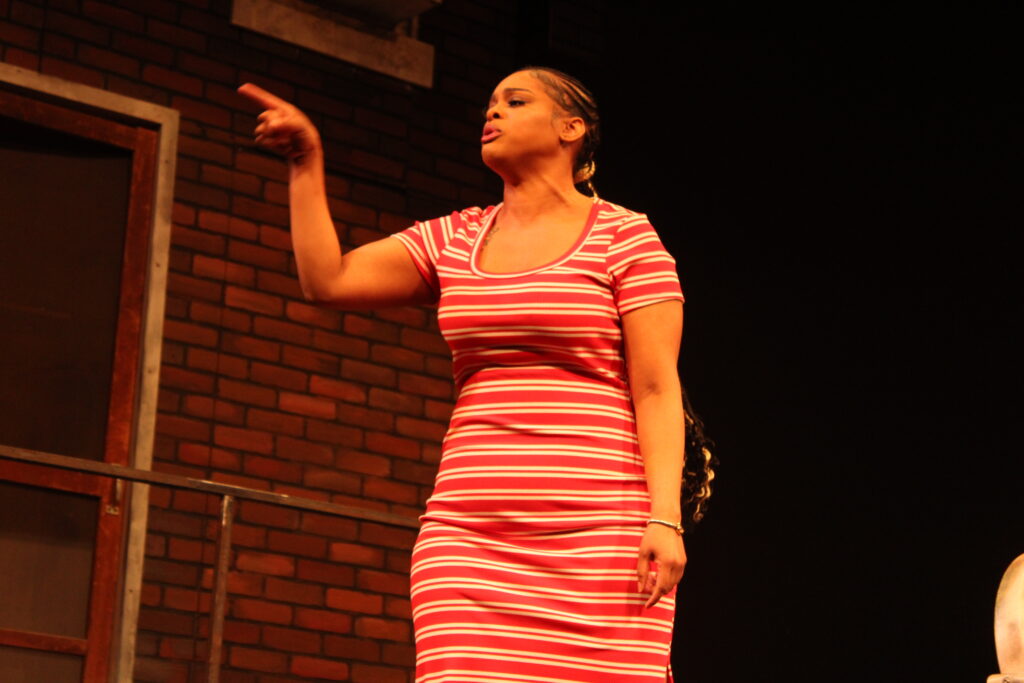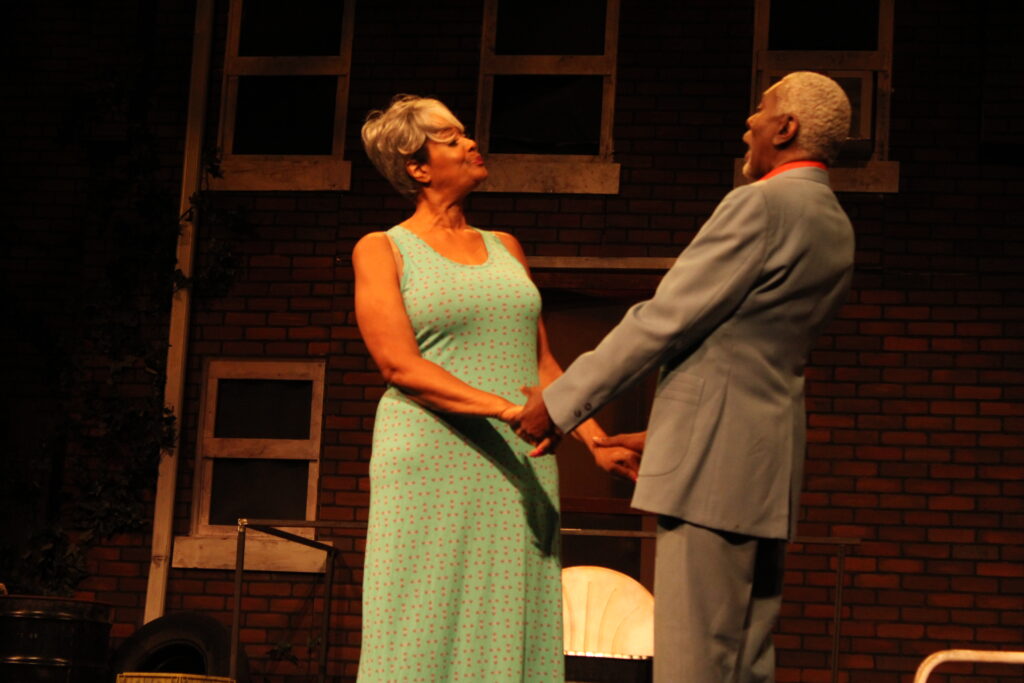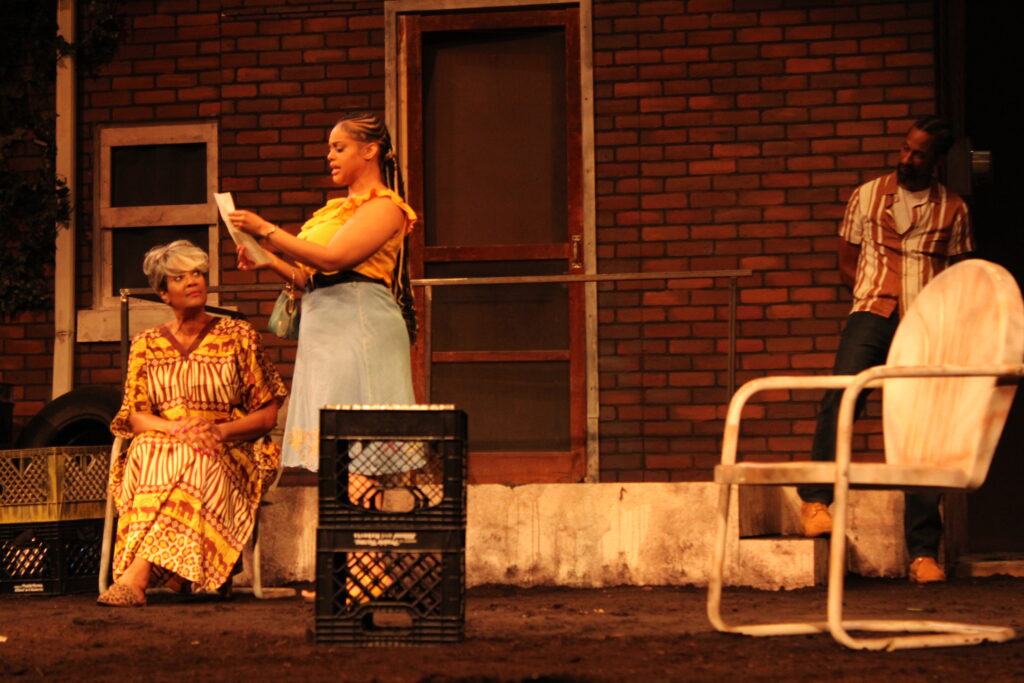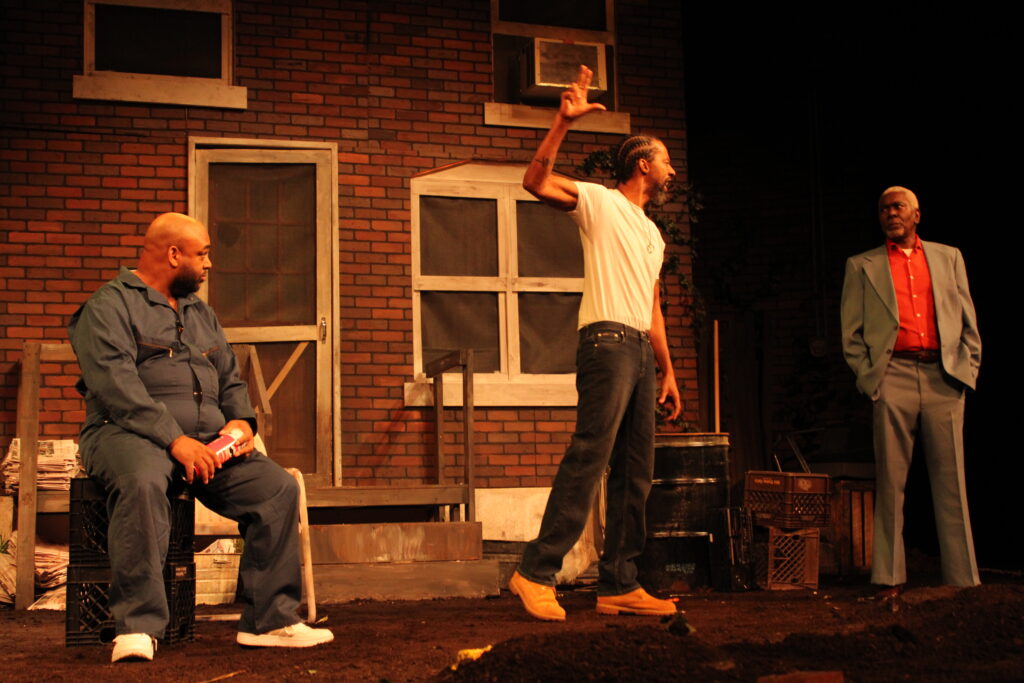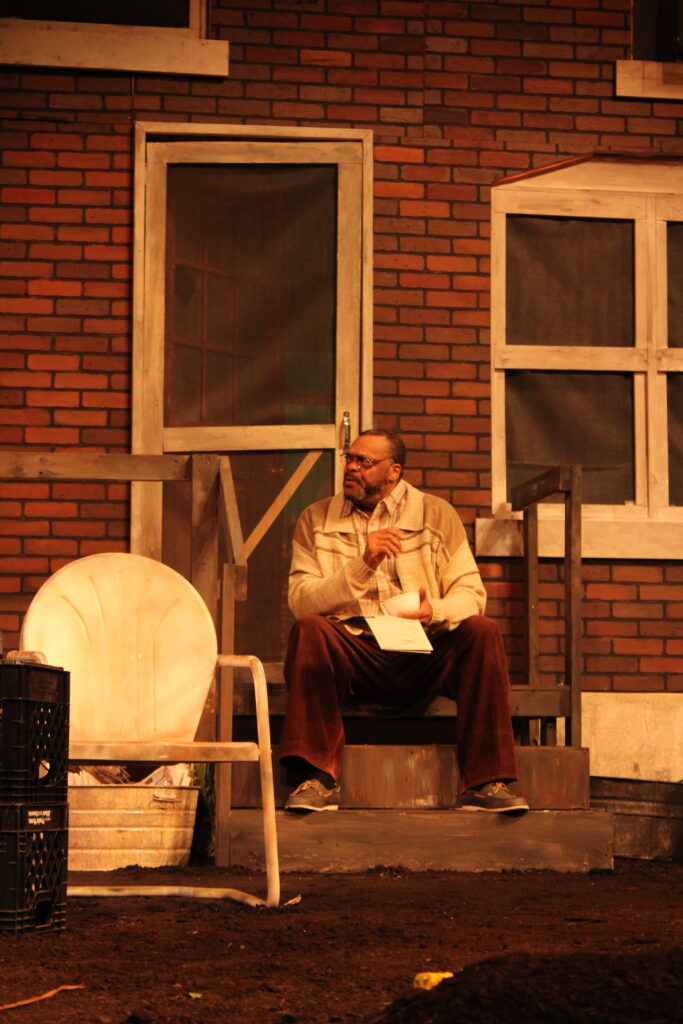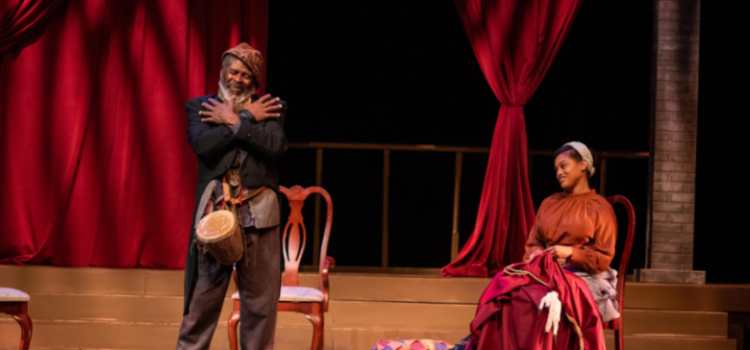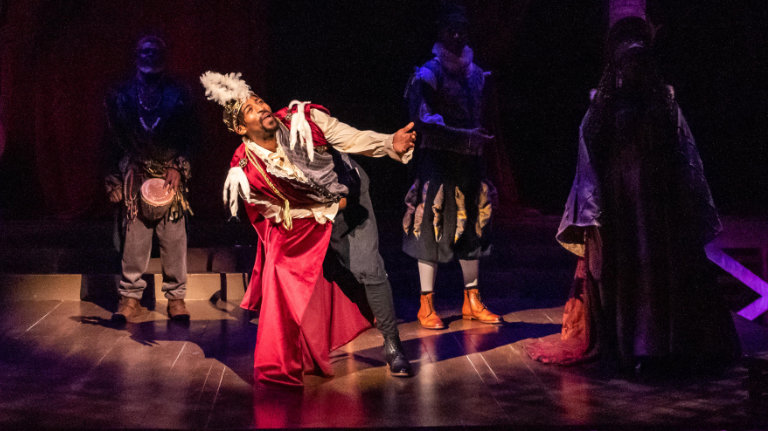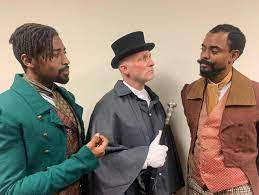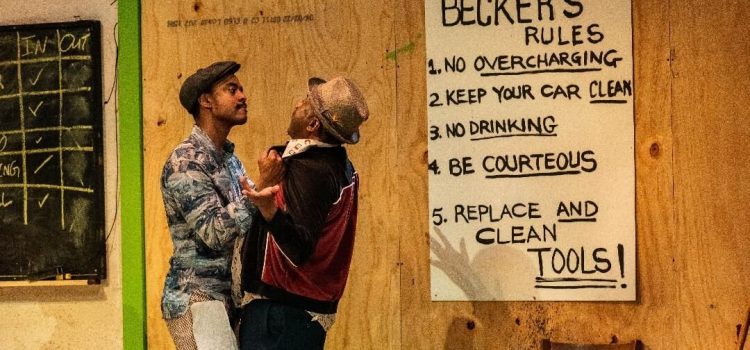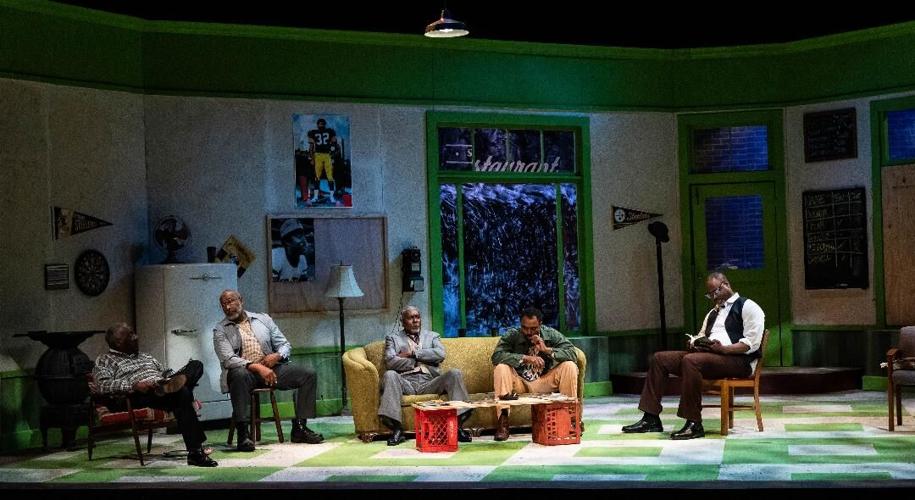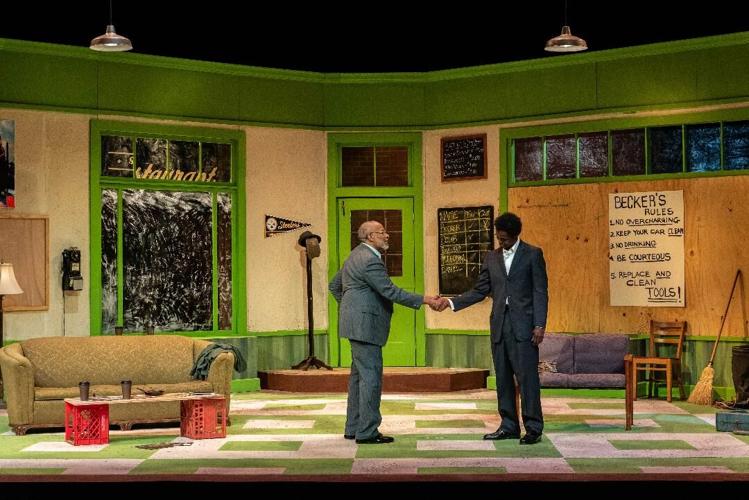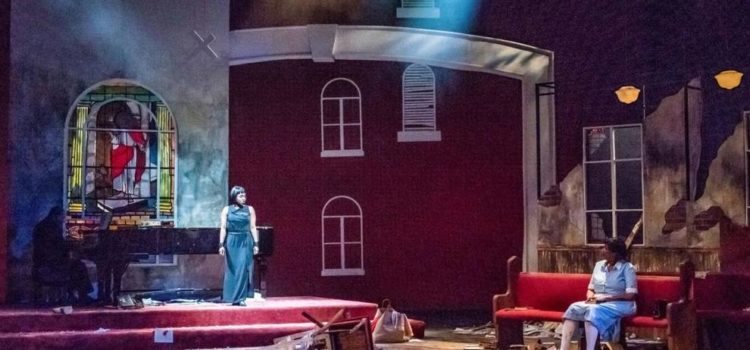By Lynn Venhaus
If your family is prone to putting the ‘fun’ in dysfunctional, you’ll be able to relate to the crowd-pleasing hijinks of “Chicken and Biscuits,” an amiable comfort-food style comedy served with a salty side of sass by the Black Rep.
Wackiness ensues when three generations of an African American family gather for the funeral of their patriarch, Bernard, who was a beloved pastor at a popular church in New Haven, Conn.
The relationships are typically complicated, starting with his two bickering daughters, prim and bossy Baneatta (Denise Thimes) and raucous and unfiltered Beverly (Paulette Dawn). The night-and-day siblings are a surefire recipe for tussling, as Baneatta has an unmistakable air of superiority and disapproval when it comes to her more flamboyant colorful sister. Played by the elegant Denise Thimes, she says a lot with a withering look or a well-delivered quip.
Thimes, an internationally renowned jazz singer, is a welcome presence on the Edison Theatre stage, and was impressive in a dramatic role in “King Hedley II” last summer. She proves her comedic skills here, and has delightful chemistry with A.C. Smith, as her husband. Of course, she bosses him around when he’s trying to be in charge.
Smith, another Black Rep veteran whose crisp timing enlivens his interactions, is zesty as the well-meaning Reginald Mabry, who will be taking over as the church’s pastor, so he feels he has a lot to prove presiding over the funeral service.
But clearly, he can’t foresee the simmering resentments that will erupt when everyone gathers.

Beverly, a bona fide drama queen, is played with cheeky bravado by Paulette Dawn, who makes her Black Rep debut but has portrayed the over-the-top character before, in her native Kansas City.
As she gripes about wearing traditional black, Beverly has decided to honor her daddy’s penchant for bright colors with a purple plunging neckline cocktail dress that she wears with a push-up bra to enhance her amble bosom. She has no qualms about showing off her attributes.
Beverly has brought along her Gen Z daughter La’Trice Franklin, played with expected attitude by Kaylyn McCoy. She doesn’t have as much history with her relatives and is written as more of an observer.
Baneatta also has a daughter, Simone, who has a big chip on her shoulder. Dumped by her fiancé for a white woman, and Alex Jay plays her as a grump, quick to argue with anyone.
She is at odds with her gay brother Kenny, who brings his boyfriend Logan Leibowitz with him. Their interracial and interfaith relationship adds a layer of complexity that isn’t explored more deeply, but Cameron Jamarr Davis and Jacob Schmidt are compelling enough actors that they give the roles more nuance than indicated (and it would have been nice for that to happen).
A few relatives are more accepting than others, which is an ongoing conflict, especially with Kenny’s mom Baneatta, who is rude and dismissive of Logan, second only to Simone’s exasperation. As written, these issues are stereotypical and not amusing, an outdated quick way to get cheap laughs.

This Jenkins family feud follows a familiar format not unlike sitcoms and other broad comedies where secrets are revealed, characters express their concerns, and disagreements are neatly resolved in a light-hearted way.
Don’t expect anything more from actor-turned-playwright Doug Lyons’ 2020 effort, which is designed to be a sunny reminder of the ties that bind, and how we share more similarities than differences in troubling times.
(It did, after all, open on Broadway Feb. 28, 2020, right before the coronavirus pandemic hit, causing widespread shutdowns, and the run was short-lived. However, there was a reboot in 2021.)
Director Ron Himes has selected a cast that gels, who work together well, and flavor this exercise with feel-good vibes. You can tell how much fun they are having as an ensemble.
Also, part of the plot is a mysterious guest, Brianna, who shows up at the funeral to deliver a eulogy that others may not like to hear. The late second act addition is played by Delisa Richardson, who makes the most of her stage time.

Another running gag is church soloist Mother Jones, whose interpretation of “Amazing Grace” receives mixed reviews but is hilarious as a comedic bit. Jermaine Manor is the musician offstage, and sound designer Kareem Deanes has fun with this element.
The set is minimal, designed by Tim Jones, which moves action between a bedroom, hotel room, church, reception gathering spot and commercial kitchen, featuring efficient lighting design by Ethan Steimel.
Costume Designer Andre Harrington has gathered an attractive selection of tasteful black dresses and striking fancy hats for the women whose last names aren’t Franklin, and outfitted the men in suitable attire. Mikhail Lynn assembled the appropriate props.
If you’re seeking a pleasant piece in these precarious times and dismal winter, “Chicken and Biscuits” is a recipe that can hit the spot. This ensemble puts the ‘fun’ in funeral as they tickle funny bones.
The St. Louis Black Repertory Company presents “Chicken and Biscuits” from Jan. 8 to Jan. 26 at the Edison Theatre on the campus of Washington University in St. Louis. Tickets are available at theblackrep.org or through the Box Office at 314-534-3807. Reduced pricing is available for seniors, educators, museum staff, students, and groups of 12 or more.


Lynn (Zipfel) Venhaus has had a continuous byline in St. Louis metro region publications since 1978. She writes features and news for Belleville News-Democrat and contributes to St. Louis magazine and other publications.
She is a Rotten Tomatoes-approved film critic, currently reviews films for Webster-Kirkwood Times and KTRS Radio, covers entertainment for PopLifeSTL.com and co-hosts podcast PopLifeSTL.com…Presents.
She is a member of Critics Choice Association, where she serves on the women’s and marketing committees; Alliance of Women Film Journalists; and on the board of the St. Louis Film Critics Association. She is a founding and board member of the St. Louis Theater Circle.
She is retired from teaching journalism/media as an adjunct college instructor.


